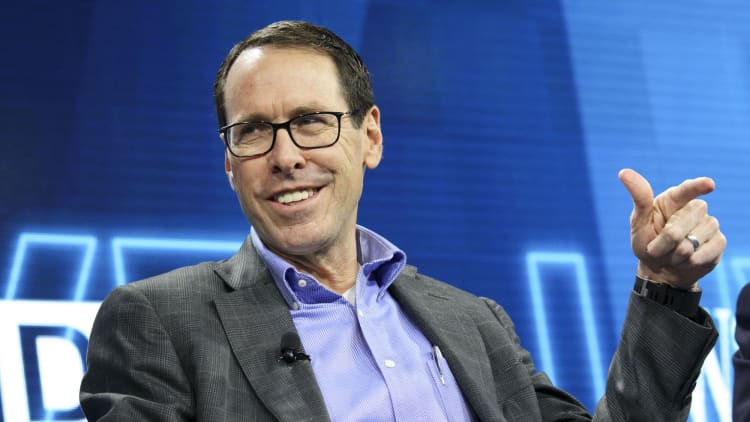
AT&T shares fell more than 2 percent, before paring some of those losses, after the telecom company reported mixed second quarter earnings and revenue.
Here’s how the company did compared with what Wall Street expected:
- Earnings: 91 cents per share vs. 85 cents per share expected by analysts surveyed by Thomson Reuters
- Revenue: $38.99 billion vs. $39.39 billion expected in the Thomson Reuters survey
- Postpaid subscriber net additions were 73,000 in the U.S.
- Linear video subscribers declined 262,000 in the quarter, while AT&T added 342,000 subscribers to its streaming service DirecTV NOW.
Taking into account new assets from the Time Warner acquisition, AT&T raised its full year earnings guidance to the "high end of $3.50 range" versus the $3.40 analysts had estimated.
Despite that AT&T's earnings and full year guidance raise, analysts remained unimpressed. Jonathan Chaplin of New Street Research said the numbers impressed because expectations were low going in.
"There's not one piece of this business that you can look at and say it's doing really well," Chaplin said on CNBC's "Closing Bell."
AT&T has been losing subscribers to its traditional television packages as more consumers cut the cord and opt for cheaper streaming services. Subscriber growth for its DirecTV Now streaming service has continued to help offset declines in satellite subscribers and legacy service revenues. In wireless, both AT&T and Verizon have been losing shares of postpaid subscribers, or customers who pay a monthly bill, to cheaper rivals.
This quarter marks the first financial report since a district judge approved AT&T's highly contested $85.4 billion acquisition of Time Warner in June. The companies moved quickly to close the deal and begin combining operations but the Justice Department appealed the court's decision, to the surprise of AT&T executives, who expressed their commitment to defending the court's decision and the landmark merger.
AT&T included WarnerMedia, formerly Time Warner, as a separate segment on its second quarter earnings report, noting it contributed revenues of $1.3 billion and operating expenses of $824 million in the 16-day period ending June 30. WarnerMedia includes cable channels, such as CNN and HBO and Warner Bros. film studio.
“We’ve now assembled the key elements of a modern media company. And it all begins with owning a wide array of premium content, because we are absolutely convinced that there is nothing that drives customer engagement like high quality premium content," CEO Randall Stephenson said on a call with investors.
On the call, Stephenson and fellow executives discussed their strategic vision for combining AT&T and Time Warner, a process that began immediately following the deal's closure.
HBO devotees panicked over the fate of their beloved network after the New York Times published some quotes from John Stankey, CEO of AT&T's new WarnerMedia division, from an internal town hall meeting. The quotes suggested the new executive was looking to make HBO more like Netflix in terms of the variety and scope of its content, but on the call, Stankey argued the story didn't "effectively characterize what we are about."
"We have a tremendous amount of great projects already in the funnel that, as the HBO team and Richard would describe it, they have not been in the position to say 'yes' to because of constraints on certain resources. What we are attempting to do is open up those constraints on very high, top quality projects that we think will balance out the schedule so we have a more engaging experience with HBO throughout the course of the year," Stankey said on a call with investors.
Stankey would not reveal exactly how much AT&T would invest into HBO for those purposes, but said the company looks forward to investing some of the efficiencies generated by the merger into direct to consumer products and premium programming.


